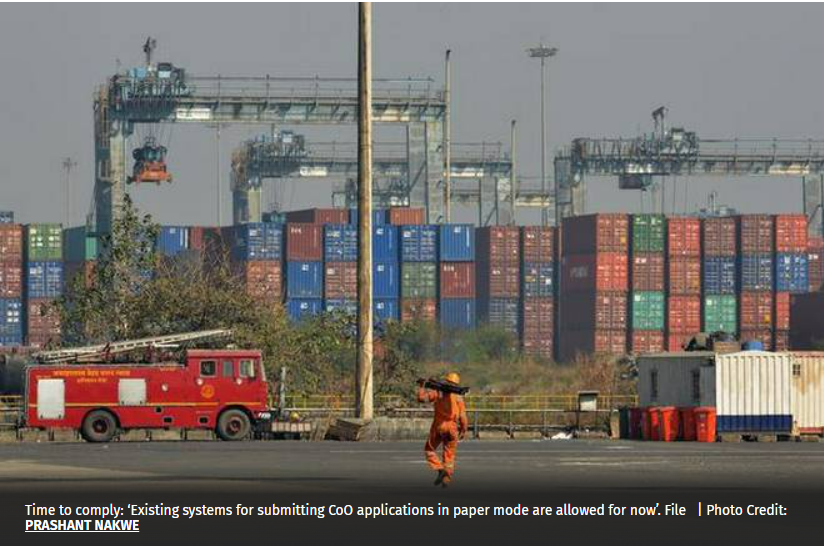Description

Figure 5: No Copyright Infringement Intended
Context:
- The Centre has suspended till 31st January 2022, a mandatory obligation imposed on exporters to obtain online Certificates of Origin (CoO) for every outbound consignment.
About Online Certificates of Origin :
- It was put in place in late 2019 for exports to countries with whom India had a preferential trade pact.
- It was expanded to cover all merchandise exports from November.
- It was initiated by the Directorate General of Foreign Trade (DGFT).
Benefits of it:
- This online facility provides ‘ease of doing business’ to the exporting community
- It gives a verifiable authentication mechanism to the partner countries to confirm the genuineness of the issued CoOs through a QR code which adds credibility to the issued e-CoO.
Reasons for suspension:
- Several exporters across States had reported difficulties in registering on the e-CoO platform on the Directorate General of Foreign Trade (DGFT) portal with the stipulated high-quality digital signature certificates and obtaining the certificates for their shipments.
- customs house agents had not been able to share data on exporters’ behalf, as the DGFT had not shared the API (Application Programming Interface) for the new platform.
Indian Exports:
- India’s monthly merchandise exports have crossed $30 billion for seven months in a row
- It is largely on course to reach the government’s target of a record $400 billion in 2021-22.
Types of Trade Agreements:
Trade and Investment Framework Agreement (TIFA)
- TIFA is a trade pact between two or more countries which establishes a framework for expanding trade and resolving outstanding disputes between countries.
- It is a first step towards FTA.
Bilateral Investment Treaty (BIT)
- It is a bilateral agreement in which two countries sit together and decide the conditions for private investments by citizens and firms of the two countries.
- At present, India has around 83 BITs or BIPAs.
Free Trade Agreement (FTA):
- A free trade agreement is an agreement in which two or more countries agree to provide preferential trade terms, tariff concession etc. to the partner country.
- India has negotiated FTA with many countries e.g. Sri Lanka and various trading blocs as well e.g. ASEAN.
Preferential Trade Agreement (PTA):
- PTAs or Generalized System of Preferences (GSP) is a special status given in trade by various countries. In this type of agreement, two or more partners give preferential right of entry to certain products by reducing duties on an agreed number of tariff lines.
- Tariffs may even be reduced to zero for some products even in a PTA. India signed a PTA with Afghanistan.
Comprehensive Economic Partnership Agreement (CEPA):
- Partnership agreement or cooperation agreement are more comprehensive than an FTA.
- CEPA covers negotiation on the trade in services and investment, and other areas of economic partnership.
- India has signed CEPAs with South Korea and Japan.
Comprehensive Economic Cooperation Agreement (CECA):
- CECA generally covers negotiation on trade tariff and TRQ (Tariff Rate Quotas) rates only. It is not as comprehensive as CEPA. India has signed CECA with Malaysia.

Figure 6: Level of Economic Integration
Common Market
- A common market is a type of trade bloc which is composed of a free trade area (for goods) with common policies on product regulation, and freedom of movement of the factors of production (capital and labour) and of enterprise and services.













